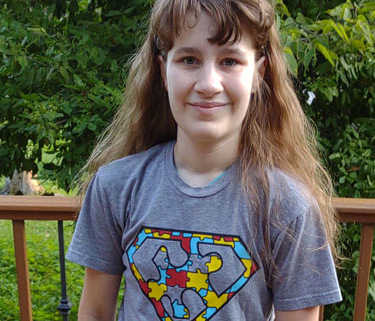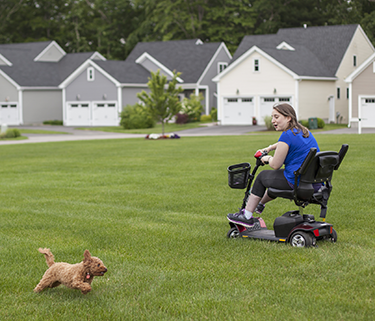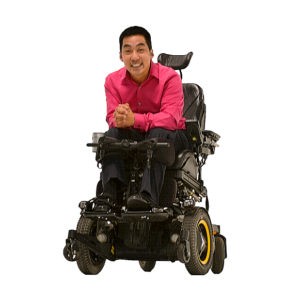Lack of Medicaid Portability Restricts Life Choices for Zoe and Other Americans With Disabilities
By Zoe in Colorado
I was born with spinal muscular atrophy, a developmental neuromuscular disease that affects every muscle in my body. My entire life, I’ve relied on someone else to do even the most basic care for me. At some point in my childhood, I was placed on a Medicaid waiver in Colorado. It allowed me access to specialized care, like home health, which wasn’t covered by my parents’ primary insurance.
When I was in the third grade, we moved states. I remember my mom spending time on the phone and filling out applications that took almost a year to complete to get me started on the new state’s Medicaid program. When we moved back to Colorado, I watched her do the same thing again, over months, until I was finally placed on a waiver again.
At the time, I didn’t realize what all of that meant. It wasn’t until I was a junior in high school, visiting colleges around the country and being recruited into top-tier honors programs, that I realized I was facing an even bigger barrier than my disability itself. Medicaid, which I now rely on daily, is nontransferable between states. It is not portable. In addition, not all states have the same programs and services to allow an individual to live independently.
Because I need 24-hour assistance that rivals the care level in an assisted living facility, home health care is necessary for me to live independently within my community. I knew that I wanted to go to college, and I knew that I wanted to live in a dorm. But as my acceptance letters began to roll in my senior year of high school, it became apparent that, unlike my peers, my choices were going to be limited—unless, of course, I wanted my mom to move into my dorm and attend classes with me. Though I love her, I knew that was not going to work.
Reluctantly, after research, calls, and dead ends, I turned down prestigious offers, including the rigorous University of California in Los Angeles. I was both ecstatic and heartbroken, knowing I was accepted in a pool of 111,000 applicants at a beautiful school, but knowing the challenges I would face if I relocated to California.
Though it became a different journey, I opted to stay in Colorado, where I am now a fourth-year honors student at the University of Denver. I live on campus independently with a team of caregivers paid through a Medicaid waiver.
Although my story is a happy one for now, the struggle remains the same. While my friends jumped around the country over the summers taking internships in their fields of study, I remained “stuck” in Colorado because I simply can’t pack up my medical equipment and caregivers and hop over to a different state. This reality remains as I look at graduate programs, forcing me to seriously consider online programs since my area of study isn’t offered locally. If I do move, for either school or a career opportunity, the consequences of a gap in Medicaid coverage are too great to risk.
I imagine not having health care coverage for months on end while I try to navigate a new state system on top of moving to a new city and state. My $26,000 medicine? My $56,000 power wheelchair? My monthly allotment of $20,000 to pay caregivers for 24-hour care? POOF! Nothing would be covered. My ventilator rental that I rely on to breathe at night? I’m not trying to be dramatic, but the truth is, I would slowly die without it. Without the drug that is keeping me stable, my body would further deteriorate.
I am privileged to have parents with the financial means to sell their home and transfer their jobs if necessary. But without those natural supports, I would never be able to move. Ever. Because I can’t simply show up and have caregivers and medical providers and Medicaid and a pharmacy and a durable medical equipment company and… and… and…
How to maintain independence is something not every 21-year-old has to think of, but it’s something that I will always have to consider when making life decisions. Until Medicaid offers a portability option, disabled Americans like me will always be restricted in their life choices in ways that our able-bodied peers never will be.




 Lauren has a bright future. She graduated from her Indiana high school at the height of the COVID-19 pandemic, but she didn’t let that stop her from advancing her education. Currently, she is working towards an associate degree in animal science, her long-time passion. With only one class remaining, she is set to get her degree this year.
Lauren has a bright future. She graduated from her Indiana high school at the height of the COVID-19 pandemic, but she didn’t let that stop her from advancing her education. Currently, she is working towards an associate degree in animal science, her long-time passion. With only one class remaining, she is set to get her degree this year. “I have to constantly monitor the account to make sure I am not working too much so that I can keep all my benefits. The support is what makes it possible for me to work, but if I do work then I could lose the support. It makes it impossible to improve and try new things. I have not gone over the limit, but the low level does make it impossible to be responsible and save for larger purchases like a car or home of my own. I am stuck as a renter or with poor-quality transportation, and I am not able to plan for the future, like retirement—things that other people my age are able to do.”
“I have to constantly monitor the account to make sure I am not working too much so that I can keep all my benefits. The support is what makes it possible for me to work, but if I do work then I could lose the support. It makes it impossible to improve and try new things. I have not gone over the limit, but the low level does make it impossible to be responsible and save for larger purchases like a car or home of my own. I am stuck as a renter or with poor-quality transportation, and I am not able to plan for the future, like retirement—things that other people my age are able to do.”








